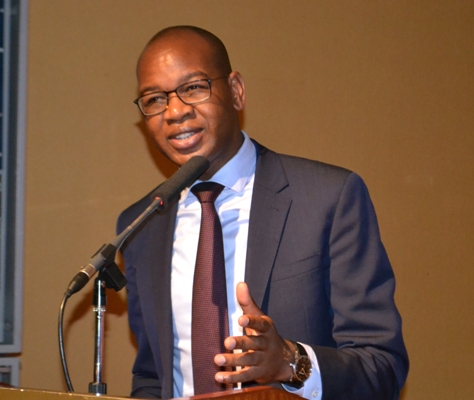KCB Group chief executive officer Joshua Oigara earned KSh273 million (UShs10.2 billion) in salary, bonus and allowances in 2018, a year when Kenya’s biggest bank by assets announced a record net profit, Business Daily reports.
Mr Oigara’s 6.6 percent (UShs634.5bn) pay increase mainly came in the form of a higher bonus of KShs180 million (UShs6.7bn) that went up from KShs147 million (UShs5.5bn) in 2017, and which more than compensated for a KSh20 million (UShs746.3m) drop in allowances to KShs10 million (UShs373.2m).
His higher bonus (and total pay package) was in tandem with KCB’s 21.8 percent growth in profit last year to KSh24 billion (UShs895.8bn), the highest-ever earnings reported by a Kenyan bank.
KCB ties bonus payments to achievement of multiple metrics, including the profitability of the group.
The bank’s employees are paid a bonus if they achieve 95 per cent or more on a scorecard of the set targets.
Bonus policy
The bank Tuesday said the main driver for the increase in the executive directors’ pay was bonus payment, which is performance-based, and an enhancement in the bank’s bonus policy for employees.
KCB, in its 2018 annual report, had said that “executive directors are entitled to a performance based bonus pay… (while) allowances paid include a house allowance, a car allowance, a telephone allowance and allowances related to loan benefit adjustment.”
The bank’s executive directors are Mr Oigara and group chief financial officer Lawrence Kimathi.
Mr Oigara’s basic salary rose by Sh3 million to Sh68 million while gratuity increased by Sh1 million to Sh14 million. His non-cash benefits that include medical insurance cover, club membership and professional indemnity cover remained flat at Sh1 million.
“The remuneration of executive directors is per the negotiated employment contracts and is the sum total of many factors, starting from the market average obtained through a regional survey of executive compensation all the way to bonuses that are linked to a range of metrics such as return on equity,” the bank said Tuesday.
Drive productivity
The performance-based pay structure adopted by the lender reflects a trend among companies that incentivise their executives based on the company’s performance to drive productivity.
Mr Kimathi’s pay rose by 39 percent from KSh59 million (UShs2.2bn) to KSh82 million (UShs3bn) last year.
Like Mr Oigara’s, it was boosted mainly by an increase in bonus from KSh23 million (UShs858.5bn) to KSh43 million (UShs1.6bn). His basic pay also went up by KSh3 million (UShs111.9bn) to KSh32 million (UShs1.19bn).
“Bonus and salary adjustments for staff are tied to achievement of multiple metrics, including profitability of the group and at all times reflect the bank’s performance in a year.
In the year under review, KCB Group PLC full year net profit rose 22 per cent to a record Sh24.0 billion from KSh19.7 billion (UShs735.19bn) reported in 2017,” the group said.
In the same year, the lender also paid its non-executive directors more. Across the group, non-executive directors were paid a total of Sh427 million (UShs15.9bn) compared with KSh400 million (UShs14.9bn) in 2017, a 6.8 percent increase.
Non-executive directors include those sitting on the boards of subsidiaries across the region.
The payout also includes allowances for those serving in Kenyan units such as KCB Capital Limited, KCB Insurance Agency Limited and the KCB Foundation.
The higher perks for Mr Oigara and Mr Kimathi are also a reward for overseeing higher returns for shareholders of the bank, who enjoyed a 16.7 percent increase in dividend earnings last year.
Dividend per share
The lender paid its owners KSh3.50 in total dividend per share last year, up from Sh3 for the year ending December 2017.
Cumulatively, the shareholders earned Sh10.7 billion in 2018, representing a KSh1.5 billion year-on-year increase.
The bank is trading at about KSh40.50 a share, putting the dividend yield at current price at 8.6 per cent. This is less than a percentage point lower than the 9.3 percent offered on the government’s risk-free one-year Treasury bill.
In 2017, the highest paid bank executive was Cooperative Bank’s Gideon Muriuki, who took home KSh370 million comprising of KSh99.8 million in salary and allowances and a KSh270.7 million bonus. The lender is yet to disclose Mr Muriuki’s pay package for last year.
Equity Bank disclosed last month that chief executive James Mwangi’s salary in 2018 remained unchanged at KSh60.4 million even as the lender’s net profit rose by five percent to KSh19.8 billion. The bank said he was not paid a bonus during the year.
He is however set to earn Sh416 million in dividends from the 208 million shares he controls in the lender.
Safaricom, Kenya’s most profitable firm and the largest listed company at the NSE by market capitalisation, paid its chief executive, Bob Collymore, KSh196 million for the year ended March 2017. The firm is expected to reveal his 2018 salary later this year.
Listed companies have since July 2017 been required to disclose directors pay in their annual reports, after the government moved to enforce the measure to deepen transparency and strengthen corporate governance.





